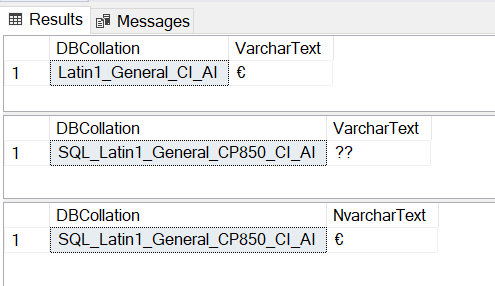Euro Symbol and Collations
-
October 28, 2022 at 3:43 pm
I'm looking to see if I can support all Western European languages in Non-Unicode columns and the first thing that sprang to mind was supporting the Euro currency symbol €.
It seemed to work, but when I changed the Collation to SQL_Latin1_General_CP850_CI_AI it failed unless I declared the value as NVARCHAR. I'm forced to work with this Collation due to inherited Databases.
Can anyone explain why the difference between Collations and, out of interest, why does it return two ? rather than 1 ?
Ideally I don't want to have to use NVARCHAR when I think VARCHAR should be sufficient to support Western European languages (if we exclude Greek), but happy to be corrected by any scholars of orthography if they know better.
CREATE DATABASE CollationTest1 COLLATE Latin1_General_CI_AI
CREATE DATABASE CollationTest2 COLLATE SQL_Latin1_General_CP850_CI_AI
GO
USE CollationTest1
GO
DECLARE @test VARCHAR(5) ='€';
SELECT 'Latin1_General_CI_AI' AS DBCollation, @test AS VarcharText;
GO
USE CollationTest2
GO
DECLARE @test VARCHAR(5) ='€';
SELECT 'SQL_Latin1_General_CP850_CI_AI' AS DBCollation, @test AS VarcharText;
GO
DECLARE @test NVARCHAR(5) = N'€';
SELECT 'SQL_Latin1_General_CP850_CI_AI' AS DBCollation, @test AS NvarcharText;
GO
-
October 29, 2022 at 4:10 pm
Thanks for posting your issue and hopefully someone will answer soon.
This is an automated bump to increase visibility of your question.
-
October 31, 2022 at 9:31 am
Not sure why it displays double ??
Wikipedia contains an overview of western codepages https://en.wikipedia.org/wiki/Western_Latin_character_sets_(computing)
https://en.wikipedia.org/wiki/Code_page_850
Looks like is is due memory limitations in the earlier days of MS-DOS
-
November 4, 2022 at 12:00 pm
Generate your test code:
Select 'DECLARE @test VARCHAR(5) = ''€'';
SELECT convert(char(100),'''+name+''' ) AS DBCollation, @test collate ' + name + ' AS VarcharText;
GO
' SelectQueries
from fn_helpcollations()
where name like '%latin%'
order by name;Johan
Learn to play, play to learn !Dont drive faster than your guardian angel can fly ...
but keeping both feet on the ground wont get you anywhere :w00t:- How to post Performance Problems
- How to post data and code to get the best help- How to prevent a sore throat after hours of presenting ppt
press F1 for solution, press shift+F1 for urgent solution 😀
Who am I ? Sometimes this is me but most of the time this is me
Viewing 4 posts - 1 through 4 (of 4 total)
You must be logged in to reply to this topic. Login to reply
